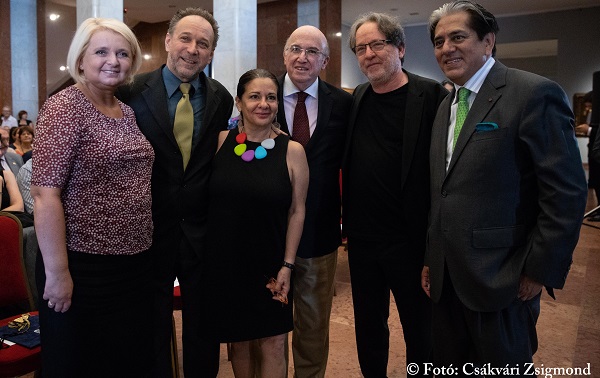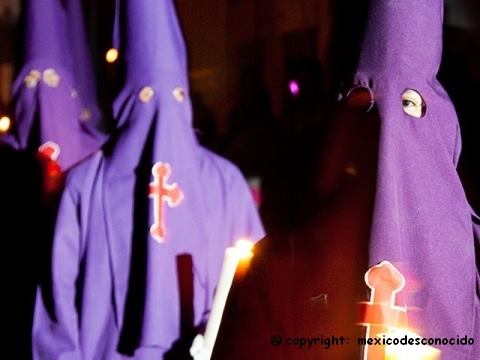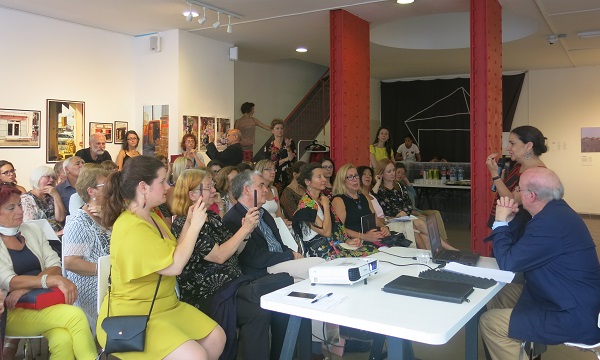- Details
- Hits: 4001
FRIDA KAHLO EXHIBITION IN THE HUNGARIAN NATIONAL GALLERY.
- Overall - the relevance of the content of the exhibition, the National Gallery of Budapest; and the most important private collection of Frida Kahlo- give Budapest a special distinction in the artistic world at a global level that will encourage people from different countries to visit this capital.
- The symbolism in the artwork of Frida Kahlo today is part of the art collection of the 20th century and without a doubt, its influence transcends contemporary artists from different countries, especially it has been the inspiration of young creators who have taken it as an emblem.
- The Embassy of Mexico in Hungary, in the framework of the promotion of Mexican culture and art, will organize a series of events within the framework of this exhibition, which are complementary and reflect the inter-institutional dialogue between Hungary and Mexico.
Budapest, Hungary, July 5th, 2018. – In the Hungarian National Gallery, the Frida Kahlo Exhibition was inaugurated, which will be open to the public from July 6th –anniversary of the birthday of the famous Mexican painter - until November 5th, 2018. Bringing Frida Kahlo's works was possible due to the joint effort of the National Gallery of Budapest and the Dolores Olmedo Museum in Mexico City, in an inter-institutional dialogue linking Hungary and Mexico, as well as owing to the support of the Ministry of Foreign Affairs and Trade of Hungary, the Agency for International Development Cooperation of the Ministry of Foreign Affairs of Mexico - through the Embassy of Mexico in Hungary - as well as the private sponsors of Gránit Bank, Group MVM, AirFrance and Sofitel. At the opening ceremony, we counted on the participation of José Luis Martínez, General Director of Educational and Cultural Cooperation of the Mexican Agency for International Development Cooperation (AMEXCID); David Nájera Rivas, Ambassador of Mexico to Hungary; Dr. László Baán, Director of the Museum of Fine Arts – Hungarian National Gallery; Mr. Carlos Phillips, Director of the Dolores Olmedo Museum, Dr. Adriana Lantos, curator of the exhibition; and the Mexican artist, Cristina Kahlo.
The exhibition has a high artistic and cultural value that gives it relevance not only in Europe but all over the world. It is important to mention that the works and the museum design are the result of the fine curatorial work of Dr. Adriana Lantos. As a whole - the relevance of the content of the exhibition, the National Gallery of Budapest; and the most important private collection of Frida Kahlo- give Budapest a special distinction in the artistic world at a global level that will encourage people from different countries to visit this capital. On the other hand, Frida Kahlo and her art are typical intrinsic elements of Mexico and the world itself. The symbolism in its composition today is part of the artistic heritage of the twentieth century and without a doubt, its influence transcends contemporary artists from different countries, especially it has been the inspiration of young creators who have taken it as an emblem.
The Embassy of Mexico in Hungary, of the promotion of Mexican culture and art, will organize a series of events related to this exhibition, which are complementary and reflect the inter-institutional dialogue between Hungary and Mexico. The first one will be the conference "Frida Kahlo - Life, Time and Work", given by Ambassador José Luis Martínez that will take place in Budapest Projekt Gallery (Kossuth Lajos utca 14-16), organized jointly with the Gallery and the City Hall of Budapest. Additionally, the Embassy prepares a series of parallel activities that will promote the exhibition linking various aspects of Mexican culture, an intrinsic theme in the work of Frida Kahlo, with Budapest, Hungary: gastronomic events, artistic programs, the participation of Mexico as a guest country in the Bártok Béla Urban Festival of Budapest, the celebration of the Day of the Dead, among other initiatives that will be announced in a timely manner.
The presence of Frida Kahlo in the National Gallery of Budapest is another example of the cultural and institutional dialogue between Mexico and Hungary, a fundamental pillar in the relations between both countries. The enthusiasm displayed by the people involved in bringing this exhibition to Hungary is a source of pride for Mexicans.

To see the photographs of the press conference of the exhibition of Frida Kahlo in the Hungarian National Gallery please click here.
To see the photographs of the official inauguration ceremony of the exhibition of Frida Kahlo in the Hungarian National Gallery please click here.
To see the photographs of the Reception of our Ambassador held in his Residence in honour of the Frida Kahlo exhibition please click here.
To see the photographs of the conference of José Luis Martínez entitled "Frida Kahlo, time and work" please click here.
About Frida Kahlo.
Frida Kahlo (July 6, 1907 - July 13, 1954), whose full name is Magdalena Carmen Frida Kahlo and Calderón, was a Mexican artist who expressed herself through her art and personality after having suffered an accident that left her bedridden for long periods of time when she was only 18 years old. Since then, he focused on painting self-portraits using a mirror inserted in the canopy of his bed that she eventually changed to an easel, each time practically perfecting his stroke with the influence of her personal experiences but also of the historical moments she was living in.
In 1928, Frida Kahlo joined the League of Young Communist, the year in which Diego Rivera painted her on the walls of the Ministry of Public Education; in 1929, she married the painter, who in November of that year was expelled from the Communist Party and later, both marched to the United States. In 1934 they returned to Mexico and three years later they hosted Leon Trotsky, when he arrived in Mexico as an asylum seeker. His relations with the old Bolshevik were profound. They had an active participation in Trotskyism and in the movement of solidarity with the Spanish Republic. In 1938 she became friends with André Breton who encouraged her to exhibit in Paris. She previously presented a sample of her work in Paris, and she had previously presented her work in New York.
In 1940, Diego and Frida got divorced and after a few months, they got married again. In 1942 she was counted among the founding members of the Seminar of Mexican Culture. Far from Trotskyism, in 1943 she entered as a teacher the Academy of La Esmeralda where some of her students were known as Los Fridos, to whom she directed the decoration of the La Rosita hairdressing and some public laundry facilities in Coyoacán. She received a government award for Moisés (1946); however, as part of her disruptive personality and unlike her contemporaries, Frida Kahlo did not venture into Mexican Muralism. In 1948 she was readmitted into the Mexican Communist Party, which she belonged to until her death, shortly before which she attended, in a wheelchair, a demonstration against the coup d'état that overthrew the president of Guatemala, Jacobo Arbenz. In 1953, an individual exhibition of her work was opened at the Contemporary Art Gallery in Mexico City, the only one that was presented in Mexico during her lifetime.
About that Mexico in which Frida Kahlo lived and developed her artwork.
Mexico flourished in the 1920s and 1930s as a liberal destination, which attracted foreign artists, writers, photographers and filmmakers, a time that came to be known as the Mexican Renaissance. The exhibition on Frida Kahlo, shows an artistic and cultural expression emanated from a post-revolutionary Mexico. After concluding a period of continuous internal struggles between 1910 and 1920, the priority of the governments following the Mexican Revolution were the need to generate a nation project as well as a national identity on the roots of institutions that remained in spite of the conflict. One of them was the National Preparatory School in Mexico City, perhaps the most important because it is the place where young Mexicans were educated under the scientific bases inherited from Positivism: lawyers, doctors, teachers and artists share the instructions of that institution; Frida Kahlo was one of those students.

- Details
- Hits: 1824
THE WORLD'S MOST POPULATED SPANISH-SPEAKING COUNTRY RECOGNIZED THOSE HUNGARIAN STUDENTS WHO HAVE DISTINGUISHED THEMSELVES IN THEIR SPANISH LANGUAGE STUDIES AT SECONDARY LEVEL
- The Ambassador of Mexico in Hungary, David Nájera, offered a reception at his Residence to recognize the most outstanding Hungarian students of the 2017/18 school year who have distinguished themselves in their Spanish language studies at secondary level.
- The 34 best Hungarian students were chosen from almost two thousand students from eleven Hungarian educational institutions and received an award of excellence in a ceremony presided over by the Mexican representative.
Budapest, Hungary, May 29th, 2018. – David Renato Nájera Rivas Ambassador Extraordinary and Plenipotentiary of Mexico in Hungary, organized on May 29, 2018 in his Residence a reception to recognize the most outstanding Hungarian students of the 2017/18 school year who have distinguished themselves in their Spanish language studies at secondary level.
The most populous Spanish-speaking country in the world has chosen between two thousand students of eleven secondary schools in Hungary the best 34 Hungarian students who have distinguished themselves in their Spanish language studies at secondary level, who received their awards from the Ambassador of Mexico in this country in a special ceremony.
Among the eleven Hungarian high schools we can find institutions from Budapest, Debrecen, Kecskemét, Miskolc, Pécs, Szeged and Veszprém that allow their students to study in Spanish, among others. At this reception, apart from the representatives of the schools, Latin American Ambassadors accredited in Hungary, former Hungarian Ambassadors in Mexico, high ranking Hungarian officials, as well as representatives of Hungarian universities and the Cervantes Institute in Budapest have also participated.
The Embassy of Mexico in Hungary presented for the first time in its history diplomas and commemorative medals to recognize outstanding Hungarian students, which clearly reflects the commitment of the Mexican government to strengthen ties of cooperation between the two countries in the cultural-educational field.
To see the photos of the event please click here!
List of the educational institutions represented
The represented schools are the Gyula Illyés High School in Budaörs, the Mihály Babits High School in Budapest, the Klára Leövey High School in Budapest, the Mihály Fazekas High School in Debrecen, the János Bolyai High School in Kecskemét, the Ottó Herman High School in Miskolc, the Zoltán Kodály High School in Pécs, the István Tömörkény High School in Szeged, the Albert Vetési High School in Veszprém, the Hungarian-Spanish Bilingual Institute Mihály Károlyi in Kispest, as well as the SEK Budapest International School.


- Details
- Hits: 5499
THE HOLY WEEK OR EASTER WHICH INCLUDES PALM SUNDAY AND THE DAY WHEN "JUDAS IS BURNT", IS CELEBRATED IN MEXICO WITH SERIOUS DEVOTION. HERE ARE FIVE UNKNOWN FACTS ABOUT THIS POPULAR FESTIVAL!
- The Holy Week, which coincides with the month of Hueytozoztli according to the ancient indigenous calendar, when the gods of the corn, Centéotl and Chicomecóatl - symbolizing the masculine and feminine duality -, were honoured and to whom the Mexicans offered corncobs of the previous year to turn them into seed.
- Palm Sunday is celebrated in various parts of Mexico with palm leaves, which are blessed and then burned to use their ashes on Ash Wednesday of the following year. Although, it is also customary to hang them behind the front door "as a defence" to allow only the passage of "positive energy".
- Previously, it was customary to wet anyone by the holy water who crossed Mexico during the Holy Saturday, a tradition that today is forbidden because of the sometimes unconscious waste of the vital liquid.
- The Holy Week is usually closed by the traditional Burning of Judas (a kind of devil or ridiculous character made by paper). This is an original custom of Spain that symbolizes the purification of the body through fire, as well as, the arrival of the planting season and the spring. In Mexico, the "Judas" has become a special handicraft made by reed, grass, paper or cardboard, its design can vary according to the region where it is elaborated.
- The date of the Holy Week changes each year because, as it is established by the clergy, Easter Sunday must coincide with the Sunday coming immediately after the first full Moon next to the spring equinox. Thus, the celebration of the Holy Week always ranges between March 22 and April 25.

© México Desconocido 2018
- Details
- Hits: 2845
AMBASSADOR DAVID NÁJERA PRESENTED HIS CREDENTIAL LETTERS TO KOLINDA GRABAR-KITAROVIĆ, PRESIDENT OF THE REPUBLIC OF CROATIA
- Ambassador David Nájera presented to the President of the Republic of Croatia, Kolinda Grabar-Kitarović, his Credential Letters that accredited him as concurrent Ambassador of Mexico to the Republic of Croatia.
- The Ambassador of Mexico transmitted the greetings of President Enrique Peña Nieto to President Grabar-Kitarović and the desire of the Government of Mexico to continue strengthening the bilateral cooperation between the two countries.
Zagreb, Croatia, May 8th 2018. – Ambassador David Renato Nájera Rivas presented today to the President of Croatia, H.E. Mrs. Kolinda Grabar-Kitarović, his Credential Letters, accrediting him as concurrent Ambassador of the United Mexican States to the Republic of Croatia.
The ceremony took place in the Official Residence of the President of Croatia, in Zagreb, during which Ambassador David Nájera endorsed the friendly relations that exist between the Croatian and Mexican people. The Ambassador of Mexico transmitted the cordial greetings of President Enrique Peña Nieto to President Grabar-Kitarović and the desire of the Government of Mexico to continue strengthening bilateral cooperation between the two countries. After the ceremony of presentation of the Credential Letters, the Ambassador met with the Deputy Minister of the Croatian General Directorate of Political Affairs, Mr. Vice Skračić in the Ministry of Foreign and European Affairs of the Republic of Croatia.
Mexico and Croatia established diplomatic relations on December 6th, 1992, through an exchange of Notes between the Permanent Representatives of both countries before the United Nations Organization, in New York. As of November 1999, the Embassy of Mexico in Hungary is concurrent with the Government of Croatia. Currently, Mr. Marin Bosotina is the Honorary Consul of Mexico in Split, Croatia and Ms. Ljerka Cerc is the Honorary Consul of Mexico in Zagreb, Croatia. In 2016, the total trade between Croatia and Mexico reached 44.8 million dollars. The main products that Mexico exported to Croatia in 2015 were vehicles for the transport of people, machines and devices to wrap merchandise and parts of seats, in accordance with figures published by the Ministry of Economy of Mexico.
Please click here to see the photographs of the ceremony!


- Details
- Hits: 2025
ON 19 MARCH 2018, ONE OF THE MOST ACCLAIMED TENORS OF OUR TIME, THE MEXICAN RAMÓN VARGAS PERFORMED HIS FIRST SONG RECITAL AT THE ERKEL THEATRE IN BUDAPEST
- The musical repertoire performed by the Mexican artist included pieces by composers such as Ferenc Liszt, Xavier Montsalvatge, Ruggiero Leoncavallo, Gioachino Antonio Rossini, among others.
- The presence of the Mexican tenor Ramón Vargas at the Erkel Theater in Budapest is an example of the cultural dialogue between Mexico and Hungary, a fundamental pillar in the relations between the two countries.
Budapest, Hungary, 20 March 2018. – Ramón Vargas, the acclaimed Mexican tenor, gave a song recital at the Erkel Theater -alternative to the Opera House in Budapest, which is being remodeled- accompanied on piano by Charles Spencer. The musical repertoire performed included pieces by composers like Ferenc Liszt, Xavier Montsalvatge, Ruggiero Leoncavallo, Gioachino Antonio Rossini, among others. After receiving the ovation from the large audience, Ramón Vargas offered a Mexican piece as an encore.
At the end of the concert, a reception was offered for Ramón Vargas and Charles Spencer with the participation of the Ambassador of Mexico in Hungary, David Nájera, as well as outstanding members of the Mexican community, professionals, academics and Mexican students on exchange programs in Hungarian institutions; members of the diplomatic corps accredited in Hungary, Hungarian cultural authorities, managers of the Budapest Opera House and members of the press.
The presence of the Mexican tenor Ramón Vargas at the Erkel Theater in Budapest is another example of the cultural dialogue between Mexico and Hungary, a fundamental pillar in the relations between the two countries. The ovation received by the tenor is a source of pride for Mexicans living in Hungary.


Page 3 of 9




